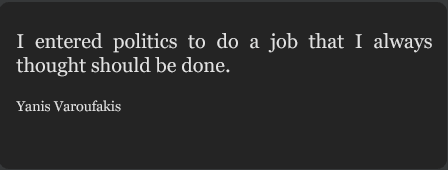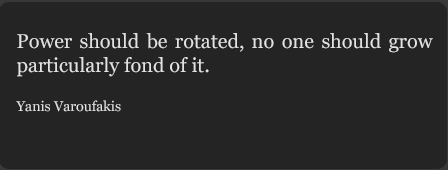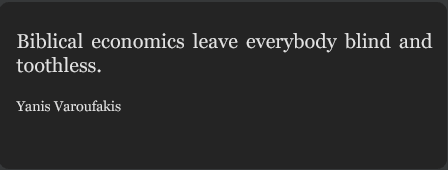Erstellt am: 24. 1. 2015 - 23:00 Uhr
"Biblical economics leave everybody blind"
Am Sonntag hat Griechenland ein neues Parlament gewählt. Das Linksbündnis SYRIZA hat knapp die absolute Mehrheit verpasst und mit den rechtspopulistischen Unabhängigen Griechen eine Regierungskoalition gebildet. Syriza-Chef Alexis Tsipras ist am Montag als neuer Ministerpräsident Griechenlands angelobt worden. Der Linkspolitiker warb im Vorfeld damit, sich um einen Schuldenerlass für Griechenland stark zu machen. Mehrere europäische Politiker lehnten einen Schuldenschnitt ab. Schon lange informeller Berater der Partei ist der Ökonom Yanis Varoufakis. Er ist zusammen mit Giannis Dragasakis einer der schärfsten Kritiker der Sparpolitik und zuständig für Finanzen im neuen Kabinett. Yanis Varoufakis wird als Finanzminister die Verhandlungen mit den Geldgebern führen. Dragasakis wird als stellvertretender Regierungschef die Aufsicht über den gesamten Bereich Finanzen und Wirtschaft haben und auch an den Verhandlungen mit den Geldgebern teilnehmen. Johanna Jaufer hat mit Finanzminister Varoufakis am Wahlwochenende ein Interview geführt.

Yanis Varoufakis
Weiterlesen:
You have been a politician for just three weeks now...
Two weeks.
Did you have to think about it very much? In your blog you wrote that you were frightened, too.
It was a major decision. Primarily, because I entered politics in order to do a job that I always thought should be done and I was offered the opportunity to do it. It has to do with the negotiations between Greece and the European Union if Syriza wins, which is an extremely scary project and prospect. At the same time I am an academic, I am a citizen, an active citizen, so I am used to dialogue where the point of the conversation really should be that I learn from you and you learn from me - we are going to have disagreements, but through these disagreements we enrich each other’s points of view.
It’s not about winning the other one over…
That's right - actually in politics, it is worse: each side tries to destroy the other side - in the eyes of the public - and that is something that is completely alien to me and something that I didn’t want to get used to.
What about your university job? Have you put it on hold?
Yes, indeed. I have resigned from University of Texas. I still retain my chair at the University of Athens - without pay - and hopefully it won’t be too long before I return to it.
Wouldn’t you be ready to stay in a government for a longer time?
No, I don’t want to make a career out of politics. Ideally, I would like somebody else to do it, and to do it better than I. It’s just that this was a window of opportunity, because Syriza rising to power is a precedence. So, it was a small window of opportunity to get something done that would not have been done otherwise. I’m not a prophet, so I can’t tell you where I will be in two, three, five, ten years. But if you’re asking me now, my ideal outcome would be that our government succeeds in renegotiating a deal with Europe that renders Greece sustainable, and then other people, you know… power should be rotated, no one should grow particularly fond of it.

Something that has been brought up quite a few times in Germany and in Austria as well, is the thing about the reparation payments - because Germany had been chickening out of paying proper reparations after World War 2 - how, in your opinion, did that happen? Was it because they said „oh, Germany is split, we will wait until it will be reunited again“, or was it also the Americans saying „ah, now we need Germany to build our military bases as well, so we will let you off the hook“ - or was it a combination?
It was a combination. Back in the 1940s, the Allies had decided to turn Germany into a peasant country again. They were about to dismantle 700 industrial plants and it was the Americans who stopped that plan - so, they did destroy 700, but then they changed their mind. They changed their mind for reasons that had to do with the way that the United States was designing global capitalism and they needed a strong currency in Europe and a strong currency in Asia - it was going to be the Deutsche Mark and the Yen - and the whole of the European union project was built around that plan. We in Europe like to think that the European union was our own creation. It wasn’t. It was an American design which then we adopted and which of course was consistent with what we wanted, our aspirations. Part of that design meant bolstering the German economy, bringing it out of depression, bringing it out of the mire in which it found itself in the 40s, and, as always, one important component of such an attempt to revive an economy includes debt relief, a serious haircut of debt, debt write off. So in 1953 there was the debt conference in London which savagely cut the debt of Germany to many nations including Greece. But Greece is a special case, because there was another debt that Germany didn’t have to any other country, because in 1943, the Kommandantur here in Athens imposed upon the Bank of Greece a deal according to which the Bank of Greece will print a lot of Drachmes - war time Drachmes - and provide them to the German authorities so the German authorities could buy materials and finance their war efforts and stock up on agricultural goods for the Wehrmacht and so on. But interestingly, the German authorities wrote a contract up. So they actually wrote down the sum of money that they borrowed. They promised to pay interest. So it was a formal loan. The document exists until this day in the (Central) Bank of Greece. That never happened with any other country. So, this is like an official debt, like in a bond, of the wartime German Nazi state towards Greece.
You can really trace it down to exact numbers?
Exact numbers. Of course, the difficulty is to translate that wartime currency which became absolutely inflationary very soon because so many Drachmes were printed. So, effectively, the German authorities, by accepting that loan from the Bank of Greece, debased the currency, and that had secondary huge social costs throughout Greece. So, it is very difficult to compute exactly what this loan means in today’s terms, how do you compound the interest, how do you convert, how do you count the cost of the hyper-inflation that was created. I mean, supposedly, our German friends are very sensitive to hyper-inflation, so they should understand that their own authorities created one in Greece as a result of that debt. My view is that we are partners, we should stop moralizing, we should stop pointing fingers at each other. Biblical economics, „an eye for an eye, a tooth for a tooth“, leave everybody blind and toothless. We should simply sit down in exact the same spirit as the United States sat down in 1953 and didn’t ask the question, „do the Germans deserve to be punished?“, „is it guilt or is it sin?“, whereas debt, I know that in German there is a conflation of these words - it’s the same word, sin and debt - as opposed to credit, for instance. We should just ask the very simple question, „how can we render the Greek social economy sustainable again so that the costs to the average German, to the average Austrian, to the average European, of the Greek crisis are minimized.

Why aren’t very many Northern European people afraid that cutting down labor rights in the 1990s could have been a foresight of exactly the same thing that is happening here (in Greece)?
I think it’s all Aesop’s fault. Because he came up with the parable of the ant and the grasshopper, where the ant works hard, never enjoyed life, kept putting money - or value - aside, and the grasshopper simply lazed in the sun, sang and did nothing and then the winter came and retribution followed. This is a good parable: Unfortunately, in Europe there is this very strange notion, that all the grasshoppers live in the South and all the ants live in the North, when in reality you have ants and grasshoppers everywhere. What has happened before the crisis - that is my re-telling of the Aesop tale - is that the grasshoppers of the North and the grasshoppers of the South combined to create a bubble, a financial bubble, bankers from the North and bankers from the South, for instance - which enriched them greatly, and allowed to sing and laze in the sun, while the ants of the North and the ants of the South worked, under increasingly difficult conditions, even during the good times, making ends meet in 2003, in 2004, was not easy for the ants of the North or of the South, and then when the bubble that the grasshoppers of the North and the grasshoppers of the South created, burst, the grasshoppers of the North and the South got together and decided that it is the fault of the ants of the North and the ants of the South. The best way of doing that was to turn the ants of the North against the ants of the South, telling them that the South was inhabited only with grasshoppers. Thus, the European Union started to fragment and the average German hates the average Greek, the average Greek hates the average German. Very soon, the average German will hate the average German and the average Greek the average Greek.
It already began, hasn’t it?
It already began. And this is exactly what happened in the 1930s, and Karl Marx was completely wrong when he said that history repeats itself as farce. Here, history just repeats itself.
Concerning Mr. Draghi’s recent decision to flood the market with trillions of Euros: You had been quoted saying that it is kind of using a water pistol against a bushfire.
I think that Draghi is well-meaning. Draghi wants to keep the Euro zone together, and he is quite skilled, actually. He is doing his best, given the constraints that he is facing. I have no doubt - he will never admit to this - but I have no doubt that he understands that what he is doing it is too little and too late - the water pistol against the bushfire. But he thinks that even a water pistol is better than nothing. If there is a fire raging, he would like to use a water canon, and he would have liked to use it earlier, but he was not allowed to, because in Europe, we have a charta of the ECB that is binding its arms behind its back and sends it into the ring to fight against the monster of deflation, which is very unfair to the ECB, and until and unless Europe understands what is necessary from an economical point of view in order to sustain a monetary union, and why this fragmentation and the increasing renationalization of everything, including now with QE (80% of bond purchases will be carried out by National Central Banks - as if they exist separately from the ECB), this fragmentation and renationalization is exactly the opposite of what we should be doing which is getting together, consolidating. How did the United States get formed? Because every time they had a crisis - the Civil War, the Great Depression - they got further together. We claim to be doing that, like „banking unions“, like the „ESM“, but we don’t. We create a banking union which is not a banking union, it is a banking disunion, and we called it in an Orwellian fashion „banking union“. So, Europe has not learned the lessons of history and until we change course, it is very unlikely we will manage to hold the whole thing together.

About SYRIZA's plans on how to revive industry in Greece, Theodoros Paraskevopoulos said that it is also about getting the pharmaceutical sector within Greece bigger again because it has a good basis. How come?
I don’t know! For some reason, we have good pharmaceutical companies that have solid exports. We need to help them and we need to create such industries in other sectors, too.
For example?
I think that we have excellent computer coders and software engineers, so we should aim doing something similar to what Israel has done. To create a network of small startup companies which are extroverted and export-oriented. If some of them get bought out by Google or so on, that is not a bad thing. This is the kind of thing that we should try to support, if we can.
In terms of also getting foreign investors to like engage in Greece, is there also a thought about something like Private Public Partnerships, a thing which Northern European Countries have got many problems with in the past?
I am not keen on public private enterprises. Wherever they have been tried, they ended up being a drain on the state, without producing any value added of significance. They were mostly cost-cutting exercises and in the end had no developmental effect. But where I believe we should be aiming at, is the development of existing public assets, without selling them - we are conducting a fire sale simply to collect revenue - so that private sector money, investment funds, can come in and develop in a way that is mutually beneficial. That is a kind of PPE, but not in a way that it was tried in Britain or elsewhere.
Getting back to the memorandum discussion: Between what factors do you believe is Mrs. Merkel stuck in?
I believe that Germany is divided. The interests of the Bank of Frankfurt are not the same as those of the Mittelstand, as those of the small and medium sized enterprises in Middle Germany, which are not the same as Siemens and Volkswagen and so on. It makes a difference whether you have your productive capacity only in Germany, as the small and medium sized enterprises do, or whether you are globalizing, have factories in China and Mexico. And Mrs. Merkel is an astute politician who realizes or thinks she has realized that there is no consensus amongst those clashing interests as to what they want to do with the Euro, with our Central Bank, with the periphery and so on. Mrs. Merkel will simply not move until there is a consensus that will guarantee her survival, politically.
But that consensus will not be possible.
Well, for instance - what happened in 2012, with Draghi’s own OMT announcement, and yesterday with QE, you can see that once there were voices that started saying, „folks, deflation is killing us, do something about it“, then she could use those voices against the Bundesbank to say, „I am going to support Draghi - whatever you do“. So, it’s not a "consensus-consensus", but she is gauging the shifting tectonic plates under her feet. And she is very astude in the way she does it. What I would like to invite her to do is to think of her legacy beyond just mere survival, and I would like her to consider the possibility, that in 10, 20, 100 years’ time, Europe could be speaking not only about the Marshall plan that saved Germany, but also the Merkel plan that saved the Euro.
Weiterlesen
- Interview, Jan. 12th: "Greece will neither want to leave the euro nor threaten to do so"
- economist.com, Jan. 20th: "A SYRIZA candidate speaks"
- Interview, Jan. 23th: "We are going to destroy the Greek oligarchy system"
- Interview, Jan. 24th: "The Greek canary in the European coalmine"


